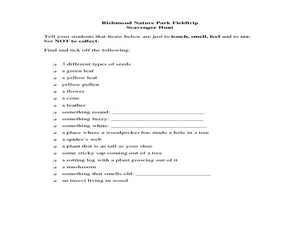Curated OER
Mighty Macroinvertebrates
Seventh graders identify the names and features of macroinvertebrates found in Turtle River. In this ecology lesson students use digital microscopes and take pictures of invertebrates.
Curated OER
Are You One of Us?
Learners investigate how scientists sort and classify organisms. For this sorting and classifying lesson, students examine what systematics are as tools that scientists use. They examine images of invertebrates and sort them while...
Curated OER
More Bait for Your Buck!
Students determine where to buy the heaviest earthworms as they study invertebrates. They create a double bar graph of the results of the weight data.
Curated OER
Richmond Nature Park Field Trip
Students identify different plants and their uses by attending a field trip. For this Canadian plant lesson, students explore the great outdoors of Vancouver, B.C. and discuss the uses of plants by the Native Americans that once resided...
Curated OER
F.B.I.
Students create a worm bin full of fruit and vegetable scraps wit paper and observe what happens over time. In this decomposers lesson plan, students observe that the fruit and vegetable scraps become new soil.
Curated OER
Classifying Animals
Students classify animals into vertebrates and invertebrates. In this animal classification lesson, students complete the online activity by dragging the animals into the correct groups. Students classify animals as vertebrates or...
Curated OER
Animal Classification
Students watch video and slide shows as an introduction to animals. They discuss classifications of animals while moving from most common to least common of the animals. Types of classifications includes herbivores/carnivores;...
Curated OER
Oddball Out- Finding the Item that Does Not Belong- Invertebrates
In this visual comparison worksheet, student look at 4 rows of invertebrates. They determine which one does not belong in the row. They check their work with the answers that are given at the bottom of the page.
Curated OER
Through the Eyes of an Owl
Learners describe vertebrates in terms of observable body parts and characteristics and describe life cycles of familiar organisms. They identify familiar organisms as part of a food chain or food web and describe their feeding...
Curated OER
Animals, Soil, Trees
Fourth graders describe the various kinds of soils and how plants and animals are affected by them. They describe the baic needs of plants, scoring at least a 3 or 4 on a 4-point rubic. Students are able to predict and/or infer what...
Curated OER
Biology Trivia Questions
Students answer 71 questions about a variety of topics in biology. In this biology trivia lesson plan, students use the internet to find the answer to questions about the systems of the body, their structures and functions, the different...
Curated OER
What is Soil?
Students examine soil. In this earth science lesson, students define and describe weathering and erosion as it relates to soil. Students compare and contrast potting soil with forest soil and complete a science observation worksheet.
California Academy of Science
What Would Happen?
Nothing says classroom fun like an invertebrate and a magnifying glass! Snails, earthworms, and roly-poly bugs become the center of attention as pint-sized investigators hone their inquiry and observation skills. They are guided through...
NOAA
Importance of Deep-Sea Ecosystems – Chemists with No Backbones
Marine invertebrates offer us many new options for developing pharmaceutical drugs, such as w-conotoxin MVIIA, which is extracted from the cone snail and is a potent painkiller. The lesson encourages scholars to research various types of...
Curated OER
The Water in Our Lives: Be the Bug
Students examine a local water supply and create a fictional invertebrate specifically adapted to thrive in that environment. They write a short story from the invertebrate's point of view.
Curated OER
The Benthic Drugstore
Pupils identify at least three pharmacologically- active chemicals derived from marine invertebrates. They describe the disease-fighting action of at least three pharmacologically-active chemicals derived from marine invertebrates.
Curated OER
What Lives In A Shell?
Second graders study the readily observable characteristics of marine invertebrates, 2nd graders research the invertebrates and complete worksheets in this series of lessons.
Curated OER
Hide and Seek Science
Students examine macro-invertebrates in order to better understand their link to the food web. Working in groups, they record observations of several areas of a stream or river, collect samples from the river bottom, and identify the...
Curated OER
Color Me
In this color me worksheet, students color and illustrate four urban invertebrates: ground beetle, ladybird beetle, firefly and tiger swallowtail.
Curated OER
TE Lesson: How Clean is that Water?
Young scholars examine the factors the affect water quality, and allow for animals and plants to live. They look at how engineers apply water quality information when making stream modifications in order to ensure drinking water quality....
Curated OER
An Episode on Australian Animals
Fifth graders identify and analyze various ecological regions of Australia in order to identify more about some of the animals that inhabit the area. Students record information they discover on a chart provided that is assessed at end...
Curated OER
Invertebrate Classification
High schoolers discuss the recent disovery of the "furry lobster" to peak interest in the animal kingdom. They classify various speciments using invertebrate dichotomous keys, identifying major animal phyla and classes. Thy the complete...
Curated OER
Comparative Embryological Study of
Students complete two labs. They observe the fertilization and development of sea urchin and zebrafish embryos. They examine the similarities and differences in the development of an invertebrate vs. a vertebrate animal.
Curated OER
Fossil Kit II
Youngsters examine four fossil replicas and chart their time periods, vertebrate or invertebrate, and the names of other organisms living at the same time. A specific fossil kit is available for sale if you do not have the same samples....
Other popular searches
- Invertebrates and Vertebrates
- Marine Invertebrates
- Invertebrates Vertebrates
- Vertebrates an Invertebrates
- Vertebrate and Invertebrates
- Benthic Invertebrates
- Invertebrates Research
- Invertebrates + Vertebrates
- Macro Invertebrates
- Estuary Invertebrates
- Macro Invertebrates
- Bentham Invertebrates

























